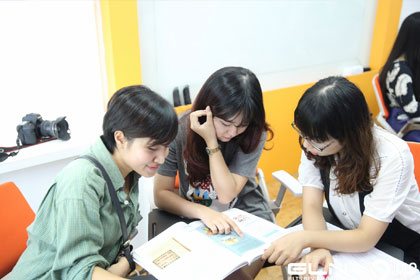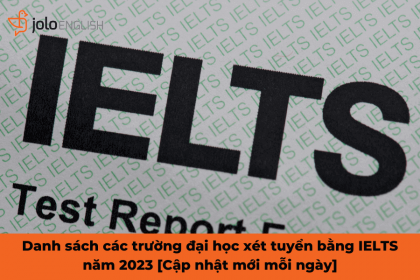Như đã hứa hẹn từ bài viết trước về chuỗi Sample Essay cho các đề Writing Task 2 đã xuất hiện trong năm 2017, hôm nay JOLO tiếp tục giúp bạn “nâng cao tay nghề” viết lách bằng việc phân tích kỹ hơn điểm mạnh Vocabulary trong các essay mẫu này nhé.
Bài tổng hợp Sample Essays: https://goo.gl/wHa4Sx

Bài làm 1:
Furnishing the young generations with tertiary education play an indispensable part in the government’s policies. However, most policy makers reckon that it is infeasible and inefficient to offer the vast majority of the youth higher education. From my perspective, I completely agree with this statement for the following reasons.
It proves impossible for a country to provide entry to tertiary education for all young people. The first reason is the prohibitive tuition fees and the inability to afford them of the majority of youths. College or university undergraduates are supposed to learn from experiments, purchase costly materials during a term, let alone other field trips if one majors in practical fields of study like engineering or medical. All of these plus the fact that many students from rural areas find it tough to meet only the annual tuition fees, especially in poverty-stricken countries. This leads to the second reason in which I mean government have other priorities such as universal education, health care system to invest in.
It also does not seem useful for the whole country once the state wish to accommodate the youth with higher education. This is primarily because there is no guarantee that students will become successful and contribute to the well-being of their nation after finishing their education. There are the cases when distinguished graduates fail to secure a decent job and thus become unemployed, exacerbating the burden on society as a consequence. Even worse, some are likely to slack off with their studies or even drop out of school as they either take higher education for granted or find no motivation in furthering their knowledge, given the thought that tertiary education is subsidised or free of charge.
In conclusion, it’s my firm belief that not only it is neither possible nor useful for a country to provide university places for a high proportion of young people.
TỪ VỰNG CẦN LƯU Ý:
- play an indispensable part in: đóng vai trò quan trọng trong một thứ gì đó
- let alone: còn chưa nhắc đến/ nghĩ đến ai đó/ chuyện gì đó
- major in (verb): có chuyên môn trong lĩnh vực gì đó
- poverty - stricken (adj): cực kỳ nghèo khổ
- accommodate somebody with something (verb): cung cấp cho ai đó cái gì đó
- contribute to (verb): đóng góp một thứ gì đó
- well - being (noun): trạng thái sống vui vẻ, khỏe mạnh và thịnh vượng
- secure a decent job: có được một công việc tốt
- exacerbate (verb): làm một vấn đề trở nên tồi tệ hơn
- slack off (verb): trở nên lười biếng, làm việc kém chăm hơn bình thương
- take something/somebody for granted (idiom): coi nhẹ, không đánh giá đúng mức giá trị của một ai đó/ một thứ gì đó
- subsidise (verb): trợ giá
- free of charge: không phải trả chi phí gì
-------------------------
Bài làm 2:
There has been a difference in subject preferences between girls who often enroll in art classes and boys who tend to study science. This could be explained by several elements, and I think that it is best not to apply any changes to this tendency.
The aforementioned situation can be attributable to gender-specific personalities and competence. First, female students are usually attracted to subjects that require tremendous self-discipline and patience like language classes while male students share a common interest in several fields that need considerable analytical abilities to excel at, for example physics or math. Second, it has been proven that each of the two sexes shows distinct competence and excellence at their favored types of subjects. And students certainly choose to participate in classes that they are best at, which is why boys and girls choose different courses to study.
In my view, it is rather unnecessary to make changes to this trend. Initially, students choose the environment where they can best cultivate their aptitudes. Therefore, if they were forced to take part in unwanted classes, it would produce undesirable outcomes, especially resentment or negative attitudes toward study at school. Furthermore, students, regardless of gender, should have their freedom of choice. In other words, they should be at liberty to decide what courses they can attend so that they would feel that they are respected and listened to.
In conclusion, distinct characteristics and competence between males and females are the causes for the two tendencies toward choosing preferable courses to study at schools or universities, and students should be entitled to participation in any class they find suitable.
TỪ VỰNG CẦN LƯU Ý:
- gender-specific personalities and competence: các đặc điểm tính cách và khả năng đặc thù của giới
- considerable analytical abilities: kỹ năng phân tích khá
- show distinct competence and excellence: cho thấy các khả năng và sở trường khác nhau
- cultivate their aptitudes: trau dồi năng lực
- resentment or negative attitudes toward study at school: sự phẫn nộ hoặc thái độ tiêu cực với việc học ở trường
- be entitled to participation in any class they find suitable: được cho phép tham gia vào bất cứ lớp học nào họ cảm thấy phù hợp
-------------------------
Bài làm 4:
Traditionally, children have begun studying foreign languages at secondary school, but introducing them earlier is recommended by some educationalists. This policy has been adopted by some educational authorities or individual schools, with both positive and negative outcomes.
The obvious argument in its favour is that young children pick up languages much more easily than teenagers. Their brains are still programmed to acquire their mother tongue, which facilitates learning another language, and unlike adolescents, they are not inhibited by self-consciousness.
The greater flexibility of the primary timetable allows for more frequent, shorter sessions and for a play-centred approach, thus maintaining learners’ enthusiasm and progress. Their command of the language in later life will benefit from this early exposure while learning other languages subsequently will be easier for them. They may also gain a better understanding of other cultures.
There are, however, some disadvantages. Primary schools teachers are generalists, and may not have the necessary skill themselves. If specialists have to be brought in to deliver these sessions, the flexibility referred to above is diminished. If primary language teaching is not standardised, secondary schools could be faced with a great variety of levels in different languages within their intake, resulting in a classroom experience which undoes the earlier gains. There is no advantage if enthusiastic primary pupils become demotivated as soon as they change schools. However, these issues can be addressed strategically within the policy adopted.
Anything which encourages language learning benefits society culturally and economically, and early exposure to language learning contributes to this. Young children’s innate abilities should be harnessed to make these benefits more achievable.
TỪ VỰNG CẦN LƯU Ý:
pick up languages: làm quen với ngôn ngữ
mother tongue: tiếng mẹ đẻ
facilitate: tạo điều kiện thuận lợi
inhibited: bị hạn chế
self-consciousness: sự tự nhận thức
play-centred approach: cách tiếp cận/ tiếp thu chủ yếu thông qua vui chơi
early exposure: sự tiếp xúc từ sớm
gain a better understanding: có được sự hiểu biết tốt hơn
bring in: đưa vào, mang vào
diminished: bị giảm bớt
standardise (verb): tiêu chuẩn hóa
undo the earlier gains: xóa bỏ những gì đạt được trước đó
demotivated: tước bỏ động cơ thúc đẩy
issues can be addressed strategically: các vấn đề có thể được giải quyết một cách có chiến lược
innate abilities: những năng lực bẩm sinh
harness: khai thác
-------------------------
Bài làm 5:
As young adults enter college, they are presented with the choice of boarding at school or living with their parents. This essay is going to argue that student accommodation is the optimal choice for undergraduates. This point will be illustrated by looking at how living at home is simply unfeasible for most students, and the benefits accruing from staying in a dormitory.
Today, very few students attend a local college or university, thus the idea of them staying at home during school term is implausible. This is particularly valid in developing nations, where most colleges are concentrated in urban centers. Daily commute would be difficult for those who live in rural areas or even suburban residents. To these students, on-campus housing is obviously the more sensible option. For example, in [country], rural citizens tend to move to the city for college and share a dorm room instead of commuting from their residences.
The choice of living at school is reinforced by the fact that it fosters personal growth in ways not otherwise possible with living at home. For instance, when boarding at a dormitory, students with discrepant preferences would learn to make compromises. This is not necessary if they live with their parents who are generally more accommodating. In addition, living away from home also teaches students to be more independent, because they must manage their personal finance as well as taking care of their own nutritional needs. In fact, Americans who lived in fraternity houses during college have reported that they became more self-reliant as a result of having to budget and cook for themselves.
In conclusion, I strongly believe that it makes more sense for college students to live on campus, for the reasons provided above.
TỪ VỰNG CẦN LƯU Ý:
boarding at school: nội trú ở trường
benefits accruing from something: những lợi ích có được từ cái gì đó
implausible: không hợp lý
particularly valid: đặc biệt phù hợp, có căn cứ
daily commute: sự di chuyển hàng ngày
suburban residents: khu dân cư ở vùng ngoại ô
on- campus housing: kí túc xá trong trường đại học
reinforce: củng cố
foster personal growth: nuôi dưỡng sự phát triển cá nhân
discrepant: không nhất quán
make compromises: dàn xếp, thỏa hiệp
personal finance: tài chính cá nhân
fraternity: hội nhóm, (từ Mỹ) hội học sinh đại học
self-reliant: có trách nhiệm với bản thân
make sense: có lý
-------------------
Tìm hiểu thêm về các Khóa Học Tiếng Anh Tại JOLO English:
- Khóa học Luyện Thi IELTS
- Khóa học Tiếng Anh Giao Tiếp
- Khóa học Tiếng Anh Tổng Quát
- Khóa học Tiếng Anh Thiếu Niên
- Khóa học Tiếng Anh Trẻ Em
Hệ Thống Trung Tâm Anh NGữ JOLO:
- Hà Nội: (024) 6652 6525
- TP. HCM: (028) 7301 5555
- JOLO: Số 4, ngõ 54 Nguyễn Thị Định, Hà Nội
- JOLO: Số 27 Trần Đại Nghĩa, Hà Nội
- JOLO: Biệt thự B8, ngõ 128 Thụy Khuê, Hà Nội
- JOLO: 62 Võ Văn Tần, Phường 6, Q.3, TP.HCM
- JOLO: Số 02, tầng 1, tòa C2, Vinhomes Central Park, Q. Bình Thạnh, TP.HCM





















